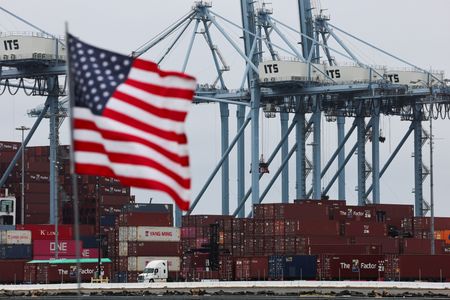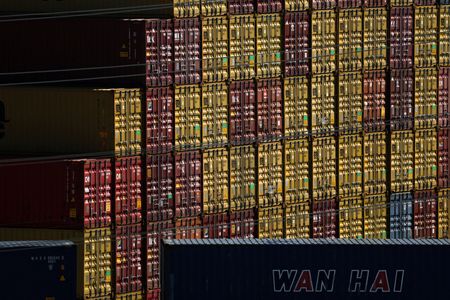By Philip Blenkinsop and David Lawder
BRUSSELS/WASHINGTON (Reuters) -The European Union on Monday accused the U.S. of resisting efforts to strike a trade deal and warned of countermeasures if no agreement is reached to avoid the punishing tariffs President Donald Trump has threatened to impose starting on August 1.
Trump, meanwhile, said he was open to further discussions with the EU and other trading partners before new 30% tariffs kick in next month and that EU officials would be coming to the United States for negotiations.
“They would like to do a different kind of a deal and we’re always open to talk, including to Europe,” he told reporters in the Oval Office. “In fact, they’re coming over. They’d like to talk.”
Trump stepped up his trade war on Saturday, saying he would impose a 30% tariff on most imports from the EU and Mexico next month, following similar warnings for other countries including Asian economic powerhouses Japan and South Korea.
The EU has so far held off on retaliatory measures to avoid a spiralling tit-for-tat escalation while there remains a chance of negotiating an improved outcome. But EU ministers emerging from a meeting in Brussels on Monday appeared closer to striking back.
Speaking at a news conference following the meeting, Danish Foreign Minister Lars Lokke Rasmussen called the tariff threat “absolutely unacceptable.”
EU Trade Chief Maros Sefcovic said he believed there was “still a potential to continue the negotiations” but voiced frustration with Washington’s failure to agree to a deal with its largest trading partner.
“As I said before, it takes two hands to clap,” he said, adding that EU member states agreed that the 27-nation bloc would need to take countermeasures if the trade negotiations with the U.S. fail.
Italy’s Foreign Minister Antonio Tajani earlier said the EU had already prepared a list of tariffs worth 21 billion euros ($24.5 billion) on U.S. goods if the two sides fail to reach a deal.
Meanwhile, Mexican President Claudia Sheinbaum said on Monday that she believed the two sides would reach a deal on security ahead of the August 1 deadline.
The White House has clarified that the 30% tariffs on Mexico, which Trump has blamed for not doing more to stem the flow of fentanyl into the U.S., would not apply to goods shipped under the USMCA trade agreement, which covers the vast majority of goods shipped from Mexico to the U.S.
Sheinbaum said any agreement would not involve U.S. forces entering Mexican territory, as previously floated by Trump.
EUROPEAN STOCKS DIP
White House economic adviser Kevin Hassett said trade talks were still under way with the European Union, Canada and Mexico. Canada is facing a tariff of 35% starting in August.
The threatened duties have sounded alarm bells in Europe, notably in Germany, the EU’s biggest economy.
After Chancellor Friedrich Merz said on Sunday that a 30% tariff would “hit the German export industry to the core”, the head of the German Chamber of Commerce and Industry called for swift action.
“The escalating tariff conflict with the USA poses a serious threat to many German companies,” Volker Treier said on Monday. “Tough negotiations are now needed to avert a collapse of transatlantic trade.”
European industries, meanwhile, are preparing for the worst.
Producers of Italy’s renowned Chianti wine in Tuscany, for example, have demanded a new export strategy backed by the EU targeting alternative markets such as South America, Asia and Africa.
Since returning to the White House earlier this year, Trump has sought to use an array of tariffs to boost the U.S. economy, push companies to invest in the United States and revitalise manufacturing.
His initial “Liberation Day” tariff announcement in April, which set a baseline tariff of 10% on all imports and higher duties on certain products or countries, raised fears of global supply chain disruptions, sending shockwaves through markets.
But subsequent U-turns and delays, including a 90-day pause on most duties aimed at allowing time for trade deal negotiations, have left investors largely inured to Trump’s chaotic policy rollouts.
European stocks fell on Monday, while U.S. indices were little changed in response to the latest salvo. European autos and alcohol stocks were among those hardest hit.
SCRAMBLE FOR DEALS
The looming August 1 deadline has set off a scramble by governments around the world to seal trade agreements.
South Korea’s top trade envoy said on Monday it may be possible to strike a deal “in principle” by the deadline and signalled that Seoul may be open to allowing the U.S. greater access to its agriculture markets, local media reported.
Minister for Trade Yeo Han-koo, who held high-level talks with U.S. officials last week, said South Korea was seeking to avoid “unfair” U.S. tariffs on key sectors that would undermine industrial cooperation with its main security ally and trading partner, media reports said.
“I believe it’s possible to reach an agreement in principle in the U.S. tariff negotiations, and then take some time to negotiate further,” the Newsis news agency quoted Yeo as telling local media reporters.
“Twenty days are not enough to come up with a perfect treaty that contains every detail,” he added.
South Korea is in a race to reach a compromise trade pact in the hope of avoiding a 25% tariff slapped on its exports, the same level faced by Japan.
(Additional reporting by Charlotte Van Campenhout, Hyunjoo Jin, Milan Strahm, Cristina Carlevaro, Andrea Shalal, Nandita Bose, Brendan O’Boyle, Kylie Madry, John Revill, Andreas Rinke, Wayne Cole and Emma RumneyWriting by Keith Weir and Joseph AxEditing by Joe Bavier and Nick Zieminski)











